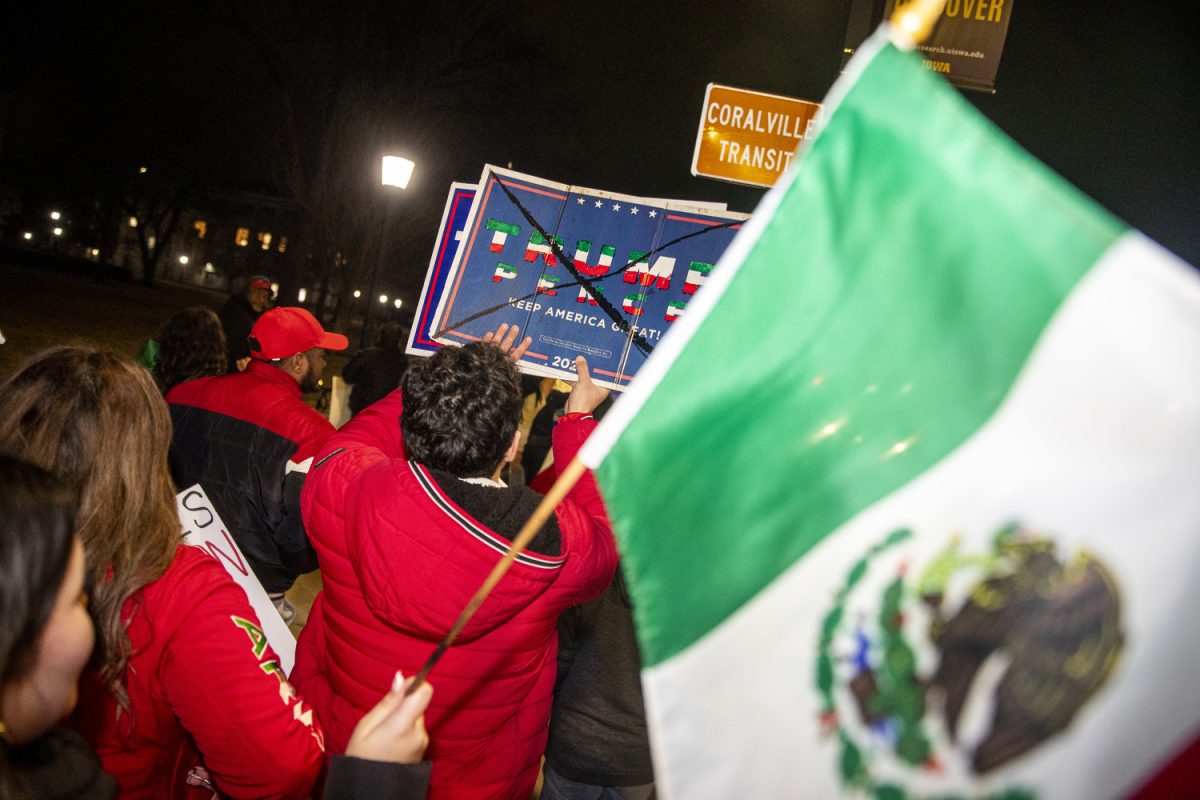The protest by Latino members of Iowa City is the latest in a lineage of protests intended to support and uplift their community’s voices.
In the wake of President Donald Trump’s executive order mandating the mass deportation of undocumented immigrants, a crowd of protestors swept through the streets of downtown Iowa City on Feb. 3.
Over 150 protesters gathered with Mexican flags waving proudly in the air, chants echoing through downtown. Their message was clear: Latino Iowans were not going to back down or hide their heritage.
The protest was organized by word-of-mouth and social media, and people of all ages were in attendance.
“That was Muscatine youth — Muscatine high schoolers, West Liberty high schoolers,” the president of University of Iowa’s Latino Student Union, Daniela Pintor-Mendoza, said. “They organized that.”
Latinos have been present in Iowa since at least the 1870s when the U.S. federal census first recorded Mexican immigrants who arrived in Iowa, including Emmanuel and “Happy” Benitas. The first Mexicans who settled in Iowa often worked on the railroad, in factories, or as sugar beet workers.
While Latinos have had a significant influence on Iowan history and culture, most of Latino history in Iowa remains obscured and undocumented.
“We have a history in Iowa. Latinos have a history in Iowa,” María Leonor Márquez Ponce, a graduate teaching assistant who worked on the LNACC Oral History Project for the University of Iowa Library’s Special Collections and Archives, said. “There are these communities in Iowa [that have existed] for a long time. There were people fighting, just like now, for rights to equal education, access to equal education, access to representation.”
As current protests against mass deportations continue to take place across the U.S., echoes of past protests and acts of resilience organized by Iowan Chicanos who fought to see themselves better represented at the UI are heard.
Working alongside nationwide movements of the 1970s like the Chicano movement and the United Farm Workers movement, Chicanos attending the UI not only fought for better treatment of farm workers in Iowa.
“They were working with these national movements to have better conditions for migrant workers — farm workers specifically — and they did a lot within the university campus and outside of classes,” Márquez Ponce said. “One of the things that they did that we are still seeing today is boycotts. At that time, they were boycotting lettuce and grapes.”
Chicanos boycotted non-United Farm Worker lettuce, an April 1973 issue of The Daily Iowan wrote, as a part of a growing movement where they demanded the UI and all of its cafeterias stop serving non-United Farm Worker produce.
The purpose behind this boycott and its protests was to protect migrant workers and pressure the agriculture industry to begin treating migrant farm workers fairly. The lettuce boycott became a tool for Chicanos in Iowa to branch into further protest and better connect with the Chicano movement, as Elisa Sanchez and Diana Gutierrez wrote in a letter to the DI in October 1972, ending their letter with, “Hasta la victoria!”
RELATED: Protest erupts in downtown Iowa City against Trump’s latest deportation plans
Other efforts by Chicanos in Iowa included increasing the enrollment of Chicanos and the amount of Chicano faculty and staff at the UI, with 25 Chicano and five Native American students estimated to have been attending the UI in 1971. To achieve the goal of increasing the enrollment of Chicano and Native American students at the UI, students visited Iowan high schools and migrant worker centers.
“[Chicanos] were protesting, but they were also showing up for their culture, and they were doing things to preserve their culture,” Márquez Ponce said. “They had a theater group, they had a dance group, and they were doing all these things while also being activists and boycotting as well.”
Claire Fox, a professor in the English, Spanish, and Portuguese departments who co-founded the Latino/a/x Studies minor alongside Omar Valerio-Jiménez, spoke about the importance of art and culture in political movements throughout history.
“What I found was lots of evidence that in every organizing meeting, there was art and that it was part of the way that people created a sense of belonging and culture and narrated what it was they were there for,” Fox said. “Political movements need to offer some vision of joy, or contentment, at least. Some soul nourishment in order to create a movement that can’t be dreary and can’t be a return to whatever horrible situation that people are trying to seek liberation from.”
These efforts to preserve culture and create a space for Latinos at the UI eventually led to the formation of LNACC, which was originally named the Chicano and Indian American Student Union, the founding of the first Latino fraternity in the Midwest, Sigma Lambda Beta, and the creation of student publications like Cafe Chicano, El Laberinto, and Nahuatzen.
While these publications are no longer in circulation, the present effects of the efforts of Iowa Chicanos are seen through organizations like the Latino Native American Cultural Center and Sigma Lambda Beta.
As for the legacy of protest by Chicanos in Iowa, Márquez Ponce emphasized the importance of documenting protests and learning about our history in order to create a sustainable, powerful movement in the present.
“They were documenting their protests, and I think it’s also important for young people today, Latino high school students and university students, to learn their history because a lot of us don’t know about it,” Márquez Ponce said. “We don’t know that there is a legacy behind us of protest, a legacy of fighting for rights like access to higher education, equal opportunities, and better representation. Not only in schools but as a whole.”



